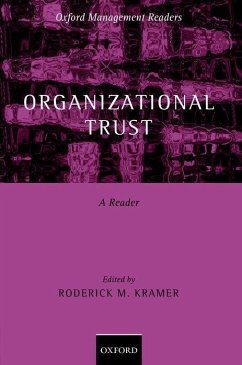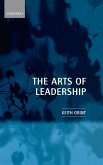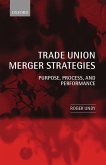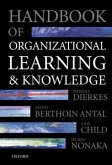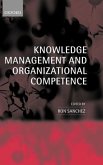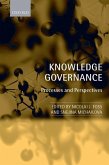- Gebundenes Buch
- Merkliste
- Auf die Merkliste
- Bewerten Bewerten
- Teilen
- Produkt teilen
- Produkterinnerung
- Produkterinnerung
Organizational Trust is a subject which has over the past decade become of increasing importance to organizational theory and research. The book examines what trust is, how it is developed and maintained, its underpinnings, manifestations, and its fragility, through a presentation and discussion of key readings.
Andere Kunden interessierten sich auch für
![The Oxford Handbook of Organizational Well Being The Oxford Handbook of Organizational Well Being]() The Oxford Handbook of Organizational Well Being210,99 €
The Oxford Handbook of Organizational Well Being210,99 €![The Arts of Leadership The Arts of Leadership]() Keith GrintThe Arts of Leadership215,99 €
Keith GrintThe Arts of Leadership215,99 €![Trade Union Merger Strategies Trade Union Merger Strategies]() R. UndyTrade Union Merger Strategies170,99 €
R. UndyTrade Union Merger Strategies170,99 €![Handbook of Organizational Learning and Knowledge Handbook of Organizational Learning and Knowledge]() Handbook of Organizational Learning and Knowledge152,99 €
Handbook of Organizational Learning and Knowledge152,99 €![Knowledge Management and Organizational Competence Knowledge Management and Organizational Competence]() Ron Sanchez (ed.)Knowledge Management and Organizational Competence231,99 €
Ron Sanchez (ed.)Knowledge Management and Organizational Competence231,99 €![Knowledge Governance Knowledge Governance]() Knowledge Governance173,99 €
Knowledge Governance173,99 €![Human Resource Management Human Resource Management]() Ashly Pinnington / Rob Macklin / Tom Campbell (eds.)Human Resource Management120,99 €
Ashly Pinnington / Rob Macklin / Tom Campbell (eds.)Human Resource Management120,99 €-
-
-
Organizational Trust is a subject which has over the past decade become of increasing importance to organizational theory and research. The book examines what trust is, how it is developed and maintained, its underpinnings, manifestations, and its fragility, through a presentation and discussion of key readings.
Hinweis: Dieser Artikel kann nur an eine deutsche Lieferadresse ausgeliefert werden.
Hinweis: Dieser Artikel kann nur an eine deutsche Lieferadresse ausgeliefert werden.
Produktdetails
- Produktdetails
- Verlag: Oxford University Press (UK)
- Seitenzahl: 498
- Erscheinungstermin: 8. Februar 2007
- Englisch
- Abmessung: 234mm x 156mm x 27mm
- Gewicht: 871g
- ISBN-13: 9780199288496
- ISBN-10: 0199288496
- Artikelnr.: 22006014
- Herstellerkennzeichnung
- Libri GmbH
- Europaallee 1
- 36244 Bad Hersfeld
- gpsr@libri.de
- Verlag: Oxford University Press (UK)
- Seitenzahl: 498
- Erscheinungstermin: 8. Februar 2007
- Englisch
- Abmessung: 234mm x 156mm x 27mm
- Gewicht: 871g
- ISBN-13: 9780199288496
- ISBN-10: 0199288496
- Artikelnr.: 22006014
- Herstellerkennzeichnung
- Libri GmbH
- Europaallee 1
- 36244 Bad Hersfeld
- gpsr@libri.de
Roderick M. Kramer is the William R. Kimball Professor of Organizational Behavoiur at the Stanford Business School, Stanford University. He has published a number of books on Organizational Behaviour and Psychology, including Trust and Distrust in Organizations: Dilemmas and Approaches (Russell Sage Foundation, 2004), written with Karen S. Cook, and Trust in Organizations (Sage, 1996), co-edited with Tom R. Tyler.
* 1: Roderick M. Kramer: Introduction: Why Trust, Why Now?
* Foundations for Organizational Trust Theory
* 2: Russell Hardin: The Street-Level Epistemology of Trust
* 3: Oliver E. Williamson: Calculativeness, Trust, and Economic
Organization
* 4: Roger C. Mayer, James H. Davis, and F. David Schoorman: An
Integrative Model of Organizational Trust
* Trust Development and Maintenance
* 5: D. Harrison McKnight, Larry L. Cummings, and Norman L. Chervany:
Initial Trust Fromation in New Organizational Relationships
* 6: Ellen M. Whitener, Susan E. Brodt, M. Audrey Korsgaard, and Jon M.
Werner: Managers as Initiators of Trust: An Exchange Relationship
Framework for Understanding Managerial Trustworthy Behavior
* 7: Peter Kollock: The Emergence of Exchange Structures: An
Experimental Study of Uncertainty, Commitment, and Trust
* Bases and Benefits of Organizational Trust
* 8: Jeffrey H. Dyer and Wujin Chu: The Role of Trustworthiness in
Reducing Transaction Costs and Improving Performance: Empirical
Evidence from the United States, Japan, and Korea
* 9: Ronald S. Burt and Marc Knez: Kinds of Third-Party Effects on
Trust
* 10: Mari Sako: Does Trust Improve Business Performance?
* Fragility of Organizational Trust
* 11: Sim B. Sitkin and Nancy L. Roth: Explaining the Limited
Effectiveness of Legalistic 'Remedies' for Trust/Distrust
* 12: Sandra L. Robinson: Turst and Breach of the Psychological
Contract
* 13: Allan Fenigstein and Peter A. Vanable: Paranoia and
Self-Consciousness
* Organizatioanl Trust in Contemporary Contexts
* 14: Gary Alan Fine and Lori Holyfield: Secrecy, Trust, and Dangerous
Leisure: Generating Group Cohesion in Vonultary Organizations
* 15: Debra Meyerson, Karl E. Weick, and Roderick M. Kramer: Swift
Trust in Temporary Groups
* 16: Reinhard Bachmann: Trust, Power, and Control in
Trans-organizational Relations
* Foundations for Organizational Trust Theory
* 2: Russell Hardin: The Street-Level Epistemology of Trust
* 3: Oliver E. Williamson: Calculativeness, Trust, and Economic
Organization
* 4: Roger C. Mayer, James H. Davis, and F. David Schoorman: An
Integrative Model of Organizational Trust
* Trust Development and Maintenance
* 5: D. Harrison McKnight, Larry L. Cummings, and Norman L. Chervany:
Initial Trust Fromation in New Organizational Relationships
* 6: Ellen M. Whitener, Susan E. Brodt, M. Audrey Korsgaard, and Jon M.
Werner: Managers as Initiators of Trust: An Exchange Relationship
Framework for Understanding Managerial Trustworthy Behavior
* 7: Peter Kollock: The Emergence of Exchange Structures: An
Experimental Study of Uncertainty, Commitment, and Trust
* Bases and Benefits of Organizational Trust
* 8: Jeffrey H. Dyer and Wujin Chu: The Role of Trustworthiness in
Reducing Transaction Costs and Improving Performance: Empirical
Evidence from the United States, Japan, and Korea
* 9: Ronald S. Burt and Marc Knez: Kinds of Third-Party Effects on
Trust
* 10: Mari Sako: Does Trust Improve Business Performance?
* Fragility of Organizational Trust
* 11: Sim B. Sitkin and Nancy L. Roth: Explaining the Limited
Effectiveness of Legalistic 'Remedies' for Trust/Distrust
* 12: Sandra L. Robinson: Turst and Breach of the Psychological
Contract
* 13: Allan Fenigstein and Peter A. Vanable: Paranoia and
Self-Consciousness
* Organizatioanl Trust in Contemporary Contexts
* 14: Gary Alan Fine and Lori Holyfield: Secrecy, Trust, and Dangerous
Leisure: Generating Group Cohesion in Vonultary Organizations
* 15: Debra Meyerson, Karl E. Weick, and Roderick M. Kramer: Swift
Trust in Temporary Groups
* 16: Reinhard Bachmann: Trust, Power, and Control in
Trans-organizational Relations
* 1: Roderick M. Kramer: Introduction: Why Trust, Why Now?
* Foundations for Organizational Trust Theory
* 2: Russell Hardin: The Street-Level Epistemology of Trust
* 3: Oliver E. Williamson: Calculativeness, Trust, and Economic
Organization
* 4: Roger C. Mayer, James H. Davis, and F. David Schoorman: An
Integrative Model of Organizational Trust
* Trust Development and Maintenance
* 5: D. Harrison McKnight, Larry L. Cummings, and Norman L. Chervany:
Initial Trust Fromation in New Organizational Relationships
* 6: Ellen M. Whitener, Susan E. Brodt, M. Audrey Korsgaard, and Jon M.
Werner: Managers as Initiators of Trust: An Exchange Relationship
Framework for Understanding Managerial Trustworthy Behavior
* 7: Peter Kollock: The Emergence of Exchange Structures: An
Experimental Study of Uncertainty, Commitment, and Trust
* Bases and Benefits of Organizational Trust
* 8: Jeffrey H. Dyer and Wujin Chu: The Role of Trustworthiness in
Reducing Transaction Costs and Improving Performance: Empirical
Evidence from the United States, Japan, and Korea
* 9: Ronald S. Burt and Marc Knez: Kinds of Third-Party Effects on
Trust
* 10: Mari Sako: Does Trust Improve Business Performance?
* Fragility of Organizational Trust
* 11: Sim B. Sitkin and Nancy L. Roth: Explaining the Limited
Effectiveness of Legalistic 'Remedies' for Trust/Distrust
* 12: Sandra L. Robinson: Turst and Breach of the Psychological
Contract
* 13: Allan Fenigstein and Peter A. Vanable: Paranoia and
Self-Consciousness
* Organizatioanl Trust in Contemporary Contexts
* 14: Gary Alan Fine and Lori Holyfield: Secrecy, Trust, and Dangerous
Leisure: Generating Group Cohesion in Vonultary Organizations
* 15: Debra Meyerson, Karl E. Weick, and Roderick M. Kramer: Swift
Trust in Temporary Groups
* 16: Reinhard Bachmann: Trust, Power, and Control in
Trans-organizational Relations
* Foundations for Organizational Trust Theory
* 2: Russell Hardin: The Street-Level Epistemology of Trust
* 3: Oliver E. Williamson: Calculativeness, Trust, and Economic
Organization
* 4: Roger C. Mayer, James H. Davis, and F. David Schoorman: An
Integrative Model of Organizational Trust
* Trust Development and Maintenance
* 5: D. Harrison McKnight, Larry L. Cummings, and Norman L. Chervany:
Initial Trust Fromation in New Organizational Relationships
* 6: Ellen M. Whitener, Susan E. Brodt, M. Audrey Korsgaard, and Jon M.
Werner: Managers as Initiators of Trust: An Exchange Relationship
Framework for Understanding Managerial Trustworthy Behavior
* 7: Peter Kollock: The Emergence of Exchange Structures: An
Experimental Study of Uncertainty, Commitment, and Trust
* Bases and Benefits of Organizational Trust
* 8: Jeffrey H. Dyer and Wujin Chu: The Role of Trustworthiness in
Reducing Transaction Costs and Improving Performance: Empirical
Evidence from the United States, Japan, and Korea
* 9: Ronald S. Burt and Marc Knez: Kinds of Third-Party Effects on
Trust
* 10: Mari Sako: Does Trust Improve Business Performance?
* Fragility of Organizational Trust
* 11: Sim B. Sitkin and Nancy L. Roth: Explaining the Limited
Effectiveness of Legalistic 'Remedies' for Trust/Distrust
* 12: Sandra L. Robinson: Turst and Breach of the Psychological
Contract
* 13: Allan Fenigstein and Peter A. Vanable: Paranoia and
Self-Consciousness
* Organizatioanl Trust in Contemporary Contexts
* 14: Gary Alan Fine and Lori Holyfield: Secrecy, Trust, and Dangerous
Leisure: Generating Group Cohesion in Vonultary Organizations
* 15: Debra Meyerson, Karl E. Weick, and Roderick M. Kramer: Swift
Trust in Temporary Groups
* 16: Reinhard Bachmann: Trust, Power, and Control in
Trans-organizational Relations

